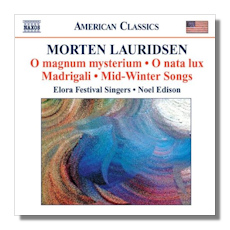
The Internet's Premier Classical Music Source
Related Links
- Lauridsen Reviews
- Latest Reviews
- More Reviews
-
By Composer
-
Collections
DVD & Blu-ray
Books
Concert Reviews
Articles/Interviews
Software
Audio
Search Amazon
Recommended Links
Site News
 CD Review
CD Review
Morten Lauridsen

- Lux aeterna (O nata lux)
- Madrigali
- Les Chansons des Roses *
- Mid-Winter Songs *
- magnum mysterium
* Leslie De'Ath, piano
Elora Festival Singers/Noel Edison
Naxos American Classics 8.559304 68:56
By the time this posts on Classical Net, I will have had the honor of working with Professor Morten Lauridsen here in Michigan as part of his residency at Oakland University. He's a legend among living composers, a "mystic" and a scholar. A fine pianist, he's been known to play on recordings of his own music, and choirs around the world adore his work. Spending the first three months of 2015 with the composer's Lux aeterna has given me a deep appreciation for the care that Lauridsen lavishes on his texts, evoking the full range of human emotion in his compositions. This glorious disc from 2007 showcases one of North America's greatest active choirs in some spectacular readings of the composer's most famous works.
The Lux aeterna is represented by its middle a cappella movement, O nata lux. Devilishly difficult to sustain and sing, many recordings either drag or rush. At just over five minutes, Noel Edison seems to find a perfect balance. The Elora Festival Singers bring this text on light to live with their careful attention to dynamics and phrasing. A horse of an entirely different color is the chillingly beautiful Madrigali. Again, the Elora singers do the music proud, capturing the shifting moods and emotional ambiguity of the early Italian poems. The Naxos sound is resonant but clear, giving home listeners a realistic and articulate way to enjoy these songs.
With Les chansons des Roses, we move into some of the more popular choral works of the past century. In particular, Dirait-on has become a choral standard for school and collegiate choirs everywhere, while Contre qui, rose isn't far behind. Naxos has inexplicably chosen not to individually track the former, which has to be frustrating if you bought the disc with that piece in mind. So lovely is the singing that you'll doubtless get over it, but there was no reason not to make things easier on the consumer. The Rainer Maria Rilke poetry makes for some truly moving art that lingers in the mind long after the music ends. Speaking from experience, the notes are fairly easy; it is the genuinely challenging expression of the text that makes the difference between a good performance and a great one. Elora's ensemble clearly gives us the latter.
The Mid-Winter Songs are again quite different. If Les chansons des Roses are all about expressive poeticism, then the Mid-Winter Songs are Lauridsen's choral tour de force. Easily the most extroverted set on the program, the choir is joined by a piano to (what else?) bring famous poems to life. This time, the author is Robert Graves. The Elora Festival Singers produce truly stunning sounds and aren't fazed at all by the virtuoso demands that Lauridsen places upon these forces. Pianist Leslie De'Ath is sensitively placed in the mix and also impresses; the piano part is hardly a walk in the park either. Finally, the disc ends with O magnum mysterium. Many Lauridsen programs take this work far too slowly, confusing ponderousness with expressivity. At a flowing tempo, Edison gets all of the emotion this little motet has to offer with none of the drag of other versions. You can definitely argue a slower tempo than this, but only if you can also maintain the dramatic tension. I prefer this swifter approach, especially when you can understand every single one of the words. This is another outstanding choral program from Naxos and the little Canadian choir that could.
Copyright © 2015, Brian Wigman





















